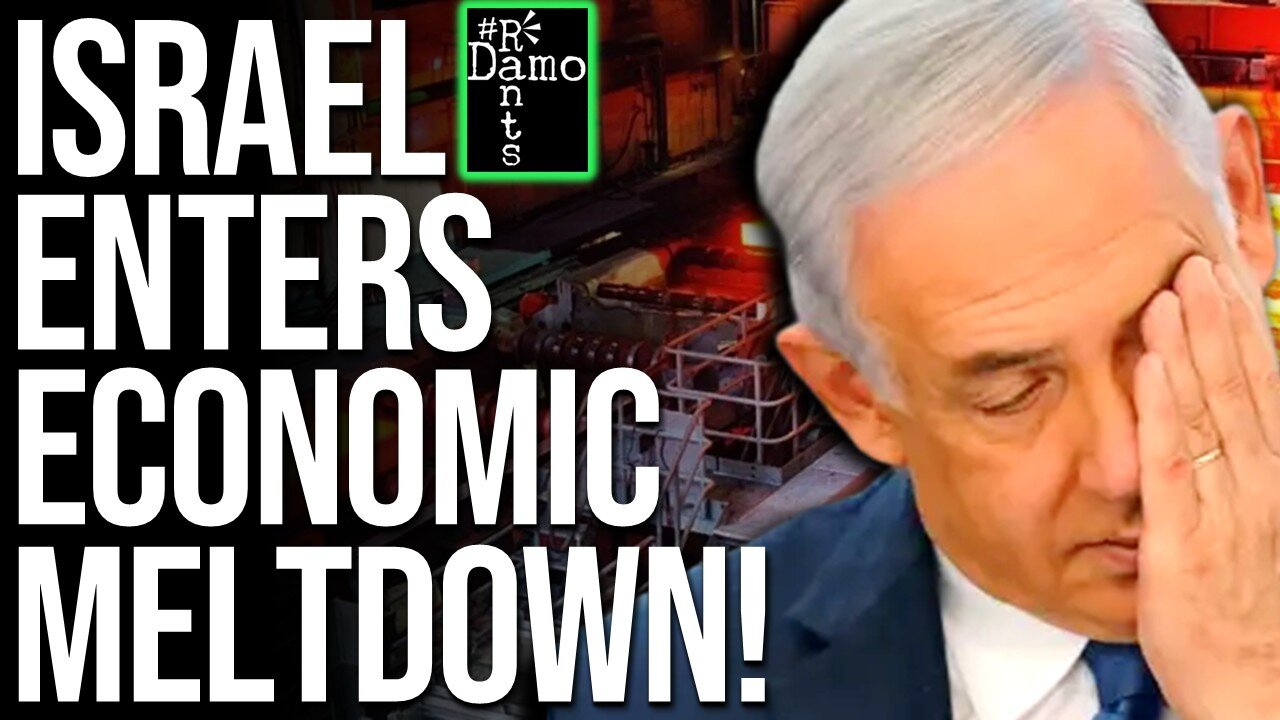Premium Only Content

War Has a Cost — And Israel’s Economy Just Got the Bill
Right, so two years on from October 7th, as we now are and Israel’s genocide of Gaza has ended up gutting its own economy. And the wreckage of that is everywhere. A steel company in Ashdod just went bankrupt as Türkiye finally cut trade over the genocide. The entire Port of Eilat is in the same boat. Growth has stalled at 0.9 per cent, defence costs have doubled, and tens of thousands of Israeli businesses have shut up shop. For decades, ratings agencies called the economy resilient, immune to politics, a “start-up nation” that could bomb with one hand and bank with the other. Well, that illusion has gone. The genocide that has starved Gaza is now starving Israel of markets, credit and confidence. The numbers say what the spokesmen won’t: the price of impunity, no matter how many Western states, leaders and other international bodies try to shield them, is still very much being paid at home. Oh dear, how sad, never mind.
Right, so Israel’s economy fracturing yet further, the reliance on international trade exposed yet again as a fundamental underlying weakness of the state that no amount of political and diplomatic cover can hide, because the numbers people, the bankers, they only care about one thing and Israel’s supposedly divine right to exist and do whatever the hell it likes isn’t it. So let’s start with the news of this latest company going bust, a mid-sized steel company in Ashdod has gone bankrupt. This was not a speculative startup or a poorly run firm. It was a functioning manufacturer that relied on regional trade — and then that trade was deliberately cut. Türkiye imposed a ban on exports and imports with Israel after the devastation in Gaza reached a scale that Ankara apparently could no longer ignore. Within months, the Shaul Gueta Company collapsed. Its petition to the Israeli courts listed debts of roughly one-hundred-and-five million shekels, about thirty-two million US dollars. Its turnover had fallen from about two-hundred million shekels in 2022 to roughly thirty-five million two years later. Seventy per cent of its income had come from Türkiye before the genocide on Gaza. Consequences for Israel, they seem so rare that they are always newsworthy. There was no mystery in the cause. The company said openly that it could not survive Türkiye’s embargo, imposed in protest at Israel’s genocide.
And the significance of this is structural. The belief that Israel’s economy was insulated from the politics of occupation ended that day. For years, officials and analysts insisted that the self-styled “Start-Up Nation” could fight indefinitely without consequence — that high technology, US aid and Western trade ties would absorb any political blow. That myth has now cracked. The Gueta bankruptcy wasn’t the beginning of Israel’s economic implosion — it’s just the latest proof of it. The rot set in long ago, when the war turned from invasion to occupation and the bills started coming due. Every month since October 2023 and frankly there were issues before that too, has tightened the squeeze — collapsing trade, falling growth, mounting debt, and an economy increasingly at war with itself. The Ashdod case didn’t trigger the crisis; it exposed how deep it already runs.
Türkiye’s trade embargo came into force in May of last year. The Bank of Israel’s subsequent assessment estimated about one billion US dollars in losses from that ban alone, again reinforcing how reliant Israel’s economy is on foreign trade and economic ties. One company’s insolvency sits inside that figure. The point is not the amount, although it’s certainly not insignificant; it is the direction. Accountability, even partial and self-interested, has entered the economy. The war’s cost is now counted in balance sheets, not just in lives.
The same pattern surfaced at the Red Sea. The Port of Eilat, Israel’s only outlet to the Indian Ocean, declared bankruptcy after commercial activity collapsed by roughly eighty-five per cent. Houthi forces in Yemen targeted Red Sea shipping as retaliation for Israel’s assault on Gaza as we know. Carriers rerouted to avoid risk; cargo volumes evaporated. By the middle of last year the port company admitted insolvency. These are not isolated disruptions. They are linked outcomes of the same policy choice — a government that treats war as sustainable encountering an external world that doesn’t agree with it.
What both of these bankruptcies expose is the fragility behind Israel’s reputation for self-reliance, it really is anything but. The economy is heavily import-dependent and regionally entangled. When neighbours close their ports or when ships refuse to sail, the domestic machine stalls. Sovereignty, coming back to that increasingly common theme in my content of late, in this sense, has limits: the state can occupy land, can devastate others with warfare, but cannot compel trade. It’s why BDS works.
The data show how deep that exposure runs too. Israel imported about 1.95 billion US dollars of “iron and steel” and 1.97 billion in “articles of iron or steel” in 2024. Index Mundi’s production series places domestic raw-steel output in Israel below half a million tonnes — negligible by industrial standards. The stainless-steel market, valued at roughly 1.05 billion US dollars in 2024, still relies largely on foreign input. These are material concerns; they are the backbone of construction and manufacturing. Cut them, and the system is anything but self sustainable.
That vulnerability exists across other Israeli sectors too, not just the example given for steel here. Total imports at 91.87 billion US dollars in 2024 and a trade deficit of 31.6 billion. GDP growth slowed to 0.9 per cent. Defence spending doubled from 4.2 per cent of GDP in 2022 to about 8 per cent in 2024. Each figure is factual, each pointing the same way. Israel is spending more on war and earning less from trade. The burden has shifted from external to internal. What once looked like control now looks like complete dependency and that’s an increasingly growing weakness.
When the Gueta Company went under, it revealed that dependency in miniature. A firm integrated into a neighbour’s supply chain cannot survive a split with that neighbour. The old model — dominance abroad, security at home — depends on a constant inflow of regional labour, materials and legitimacy. When that legitimacy fractures, even a well-connected state begins to look increasingly more vulnerable.
By the middle of last year, about 46 000 Israeli businesses had already closed. Some closures were temporary; many were not. Tourism had collapsed. Consumer spending contracted. The combination of mobilisation of working people being drafted, inflation and falling confidence produced the first broad stagnation since the pandemic. S&P’s reaffirmation of Israel’s credit rating came with a negative outlook and a warning about security risk. The OECD’s 2025 outlook described high defence costs and slowing investment. None of these institutions are political opponents of Israel, they’re simply number crunchers when we boil it all down. Their data confirm what domestic rhetoric still denies — that the war’s economic price is real.
Therefore Israel can choose repression, but it cannot choose immunity. Their choice comes at a national cost. Every strike on Gaza now carries a financial echo. Each month of siege is another notch of deficit and lost capital. The line between moral and economic isolation is closing in and although you can argue other states like the US might prop them up, again it comes at cost.
Türkiye’s role illustrates both the potential and the limits of regional pressure. Ankara cut trade in metals, cement and other materials tied to construction. It did not halt energy transit. Crude oil shipments from the port of Ceyhan to Israel have continued regardless. Roughly forty per cent of Israel’s crude supply arrives through the Baku-Tbilisi-Ceyhan pipeline from Azerbaijan. At 1.27 US dollars per barrel in transit fees, Türkiye has no incentive to shut that flow off, so they’re morality via their embargo only goes so far, Erdogan is very much two-faced. The government publicly denied that oil still moved to Israel, calling such claims unfounded. Yet UN trade data compiled by Turkish Minute showed Türkiye remained Israel’s fifth-largest exporter throughout last year with nearly 2.9 billion US dollars in recorded trade. The numbers contradict the rhetoric, but the embargo’s partial enforcement, as it functionally is, still had effect. It closed a channel that mattered enough to bankrupt a company. So there are still consequences here.
Ankara’s double posture exposes the reality of selective accountability. States act where the cost suits them. Türkiye punished Israel in sectors that delivered domestic political gain and international approval while protecting its energy interests. Israel still paid a price, they could be paying a bigger and more meaningful one though. The myth of total insulation died even under a half-enforced embargo. The failure of the Ashdod plant is proof that partial measures still bite.
The internal side of the equation shows the same erosion. Mobilisation for war removed tens of thousands from civilian work. Agriculture, construction and technology sectors lost staff. Foreign labour contracted as insecurity rose. Supply lines tightened. The gap was filled not by efficiency but by deficit spending. Military expenditure rising from four to eight per cent of GDP within two years created a structural shift. That shift competes with social budgets and forces higher borrowing. With growth below one per cent, the cost of capital rises. Debt service climbs; inflation cuts wages. We experience the same thing here in the UK, but our media try to convince us that 0.5% of GDP growth is great. No it isn’t! But back to the point at hand with Israel, a country cannot indefinitely fund occupation abroad and consumption at home when both depend on imported capital and materials.
What is now visible is not collapse but repricing — the market adjusting to risk created by political arrogance. The rating outlooks, the bankruptcies, the deficit numbers, the insurance premiums for Red Sea routes — they are all instruments of the same correction. The world is beginning to charge Israel the interest it has avoided for decades.
The line of accountability is perhaps not an obvious one, but it does nevertheless add up. No formal sanctions regime exists. Yet Israeli firms are losing access to partners, investors are adjusting exposure, and logistical costs are rising. Markets are not moral actors, they are anything but as a rule, but they react to instability. When instability is tied to a state’s own aggression, financial discipline starts to resemble justice anyway. S&P and Moody’s adjustments are technical events, but their effect is political: they make continued war more expensive. Insurance underwriters now price shipments to Israeli ports higher because of Red Sea risk. Pension funds face public campaigns against holding Israeli bonds. Universities, charities and consumers are shifting procurement. These changes are incremental, but they are new as well. The cost of impunity is entering ordinary accounting now.
The same logic applies domestically. The Port of Eilat is no longer a functioning trade gateway. The “Start-Up Nation” narrative that once insulated the government from criticism now rings hollow. Start-ups depend on foreign capital and open markets. Both are sensitive to perception. Investors read the same news as everyone else does. A government that faces genocide allegations at the ICJ cannot also sell itself as a safe innovation hub without paying some sort of penalty. That discount is now visible in capital flight, postponed projects and a flattening growth curve.
And what is especially notable here is that history teaches us that an economic reckoning often precedes political change. The numbers strip away rhetoric. They show that sovereignty maintained through coercion creates dependence elsewhere — on loans, on imported labour, on external tolerance. Israel’s power abroad is being met by counter-power in the language it cannot ignore: price.
The state still has buffers. US aid continues, it may even increase. Western banks maintain lines of credit. Some regional partners stay quiet. None of this alters the trajectory though. Every layer of support now carries increasing reputational cost for those who provide it. Governments that shield Israel diplomatically are underwriting an economy whose fundamentals are weakening under their own eyes and who’s own citizens resent paying for that. That is the beginning of isolation. It moves not through boycotts but through risk assessments and budget reviews and electability.
At street level, the effect is visible. Shops closed. Construction slowed. Agricultural exports stuck at ports that no longer receive reliable shipping. Inflation and taxation eroding disposable income. Citizens feel the pressure but are told it is the price of security. Well, more and more are choosing to leave Israel presumably to go back to where they are really from to get away from it all. It is in fact the price of impunity — a debt incurred by state choices. The government could change course. It has chosen not to and is doubling down on it, all tied of course when you pull all the strands together, to keeping Benjamin Netanyahu in power.
The repetition of “resilience” in official language is itself a tell. Resilience is what governments say when they are absorbing damage. The data contradicts the sloganeering though. Growth below one per cent is not resilience. Doubling defence spending is not stability. A bankrupt port and a bankrupt steel firm are not anomalies. They are warnings written into the accounts.
This was not an oversight. It was policy. Ankara chose to act. The Houthis chose to target shipping. Credit agencies chose to recalculate. Each made a sovereign decision in response to Israel’s own. Israel has learned that sovereignty cuts both ways even if their own is considered deified. Power projected outward invites resistance inward. The economic price is only beginning to show, but it is showing and it is showing Israel that they aren’t special when the accounts are made to balance.
Of course one destination for Israelis choosing to get away from Israel has been Cyprus – just off the coast, very appealing, concern has been growing that Israel is buying too much land and property there in fact, some concerned that Israel is attempting Operation Promised Land 2.0 there after Palestine. What a preposterous idea many said and then an Israeli gets sent down for 5 years on 40 charges of apparent land theft. Not so far fetched anymore then? Get all the details of that story in this video recommendation here as your suggested next watch.
Please do also hit like, share and subscribe if you haven’t done so already so as to ensure you don’t miss out on all new daily content as well as spreading the word and helping to support the channel at the same time which is very much appreciated, holding power to account for ordinary working class people and I will hopefully catch you on the next vid. Cheers folks.
-
 57:26
57:26
X22 Report
7 hours agoMr & Mrs X - The Food Industry Is Trying To Pull A Fast One On RFK Jr (MAHA), This Will Fail - EP 14
85.2K50 -
 2:01:08
2:01:08
LFA TV
1 day agoTHE RUMBLE RUNDOWN LIVE @9AM EST
142K11 -
 1:28:14
1:28:14
On Call with Dr. Mary Talley Bowden
5 hours agoI came for my wife.
21.3K20 -
 1:06:36
1:06:36
Wendy Bell Radio
10 hours agoPet Talk With The Pet Doc
59.6K28 -
 30:58
30:58
SouthernbelleReacts
2 days ago $7.50 earnedWe Didn’t Expect That Ending… ‘Welcome to Derry’ S1 E1 Reaction
31.8K9 -
 13:51
13:51
True Crime | Unsolved Cases | Mysterious Stories
5 days ago $17.84 earned7 Real Life Heroes Caught on Camera (Remastered Audio)
48.9K11 -
 LIVE
LIVE
Total Horse Channel
16 hours ago2025 IRCHA Derby & Horse Show - November 1st
112 watching -
 4:19
4:19
PistonPop-TV
6 days ago $7.81 earnedThe 4E-FTE: Toyota’s Smallest Turbo Monster
41.5K1 -
 43:07
43:07
WanderingWithWine
6 days ago $4.78 earned5 Dreamy Italian Houses You Can Own Now! Homes for Sale in Italy
30.6K9 -
 LIVE
LIVE
Spartan
1 day agoFirst playthrough of First Berserker Khazan
99 watching